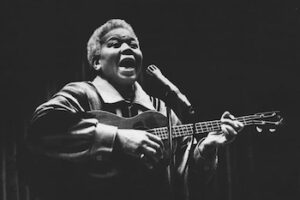
Ella Jenkins
*Ella Jenkins was born on this date in 1924. She was a Black Folk singer-songwriter.
Ella Louise Jenkins was born in St. Louis, Missouri, and grew up in predominantly lower-middle-class neighborhoods in the south side of Chicago. Growing up in a Christian scientific family with eclectic musical tastes, she benefited from her rich musical surroundings. Her uncle, Floyd, introduced her to the harmonica and the blues music of T-Bone Walker, Memphis Slim, Little Brother Montgomery, and Big Bill Broonzy.
Her family moved around the south side to different neighborhoods where she learned new children's rhythms, rhymes, and games. Gospel music became a part of her soundscape as neighborhood churches broadcast their services onto the streets. She also enjoyed tap dancing lessons at the local theater and could go to the Regal Theater to see Count Basie and Peg Leg Bates. Cab Calloway is the person she credits with getting her interested in call-and-response singing.
While attending Woodrow Wilson Junior College, she became interested in the music of other cultures through her Mexican, Cuban, and Puerto Rican friends. In 1951, Jenkins earned a Bachelor of Arts in Sociology with minors in Child Psychology and Recreation from San Francisco State University. Here, she picked up songs of Jewish culture from her roommates. After graduation, Jenkins returned to Chicago and began her calling, writing songs for children while volunteering in recreation centers. She was a Teenage Program Director for the YWCA in 1952.
While there, Jenkins performed on the Chicago public television show The Totem Club. She was soon offered a regular job as the host of its Thursday program, which she entitled This is Rhythm. She had guests from many cultures share their music's rhythms on her show. In 1956, Jenkins decided to become a full-time musician. She began as a children's musician touring school assemblies around the country, often sleeping in a different place each night amid racial discrimination. As she performed in more varied venues, she began to write music about her experiences.
Later that year, Jenkins met Kenneth S. Goldstein at the Chicago Gate of Horn folk music club. He introduced her to Moses Asch of Folkways Records. Asch was receptive to her music, and in 1957, her first album, Call-And-Response: Rhythmic Group Singing. Called "The First Lady of the Children's Folk Song," she was a leading folk and children's music performer. As a performer and educator, Jenkins has performed her songs on all seven continents (even Antarctica). She shared her music and learned about people's cultures, sharing her musical traditions and languages with her audiences. Jenkins made television appearances in films, performing at America's Reunion on the Mall in 1993 and America's Millennium Celebration in 2000.
In collaboration with the John F. Kennedy Center for the Performing Arts, she was a U.S. delegate to Hong Kong, the People's Republic of China, and Russia. As a recording artist, Jenkins received Parents' Choice awards and two Grammy Award nominations in the Best Musical Album for Children category. In 2004, she received a Grammy Lifetime Achievement Award. Jenkins released over 39 albums, including the popular You'll Sing a Song and I'll Sing a Song. Her 1995 album Multicultural Children's Songs is the most popular Smithsonian Folkways release. She participated in many conferences on music education and offered workshops for music educators, parents, and caregivers globally. Her final album, Camp Songs with Ella Jenkins and Friends, was released in 2017. Ella Jenkins died on November 9, 2024, at an assisted living facility in Chicago; she was 100.
To Become a musician or Singer
To Become a Conductor or Composer
The Oxford Companion to Women’s Writing in the United States.
Ed. Cathy N. Davidson, Linda Wagner-Martin.
New York: Oxford University Press, 1995.
Copyright © 1995 by Oxford University Press.